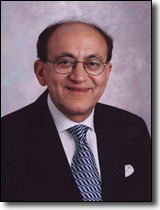


A solid tumor is an aberrant organ composed of cancer cells and host cells – all embedded in an extracellular matrix and nourished by blood vessels. A blood-borne therapeutic agent must overcome vascular and extra-vascular physiological barriers in its journey from the circulatory system to cancer cells in solid tumors. To gain insight into each of these barriers, we developed innovative animal models that permit direct visualization of molecular and cellular events in tumors and surrounding host tissue. We also developed transgenic mice that express GFP when the promoters of genes involved in tumor growth and vascular development are activated. Finally, to extract quantitative information about parameters of interest, we developed new computer-assisted imaging technology and mathematical models.
Applying these unique technologies and animal models, we have carefully and rigorously dissected each of the physiological barriers in tumors including abnormal angiogenesis and blood flow; vascular permeability; interstitial convection, diffusion and binding; lymphangiogenesis and lymphatic function; leukocyte-endothelial adhesion; pH and pO2 gradients; and host versus tumor contribution to the production of pro- and anti-angiogenic molecules. In many cases, our work represents the only source of data in this field.
We have applied the insight gained from such an approach to overcome barriers to drug delivery and efficacy. In my presentation, I will discuss an emerging concept – normalization of tumor vessels using antiangiogenic agents – that has resulted from such an approach. This counter-intuitive concept offers an explanation for successful outcome of combination of antiangiogenic therapy with cytotoxic therapy in the clinic. I will first present preclinical evidence for vessel normalization, then clinical evidence, and finally, the molecular underpinnings of vessel normalization – all gained from in vivo imaging.
Dr. Rakesh K. Jain is the Andrew Werk Cook Professor of Tumor Biology in the Department of Radiation Oncology at Harvard Medical School, and Director of Edwin L. Steele Laboratory of Tumor Biology at Massachusetts General Hospital. He is regarded as a pioneer in the fields of tumor biology and in vivo imaging. He developed an impressive array of imaging technologies and sophisticated animal and mathematical models, through which he gained unprecedented molecular, cellular, anatomical and functional insight into the inner workings of solid tumors and the role of host-tumor interactions. He also translated this insight into improved strategies for cancer detection and treatment (Science 307:58-62, 2005). A mentor to more than 100 master's, doctoral and postdoctoral students from multiple disciplines, his collaborative efforts are summarized in more than 380 publications and six patents. He has edited six monographs on topics ranging from bioengineering to cancer. He serves on advisory panels to government, industry and academia, and is a member of editorial boards of ten journals, including Cancer Research and Nature Reviews Cancer (Highlights). His contributions have been recognized by more than 25 major awards, including a Guggenheim Fellowship (1983-1984), Humboldt Senior Scientist Award (1990-1991), Outstanding Investigator Grant of the National Cancer Institute (1993-2000), and memberships in the Institute of Medicine (2003) and National Academy of Engineering (2004) of the United States National Academies. Most recently, he received the Outstanding Academic Scientist of the Year Award from the 2005 Pharmaceutical Achievements Awards, and will be bestowed the Distinguished Service Award at the Nature Biotechnology Winter Meeting on Angiogenesis in Miami in February 2006. Dr. Jain received the MS and PhD degrees in chemical engineering in 1974 and 1976 from the University of Delaware, India. He served as Assistant Professor of Chemical Engineering at Columbia University (1976 to 1978), and as Assistant (1978-79), Associate (1979-83) and Full Professor (1983-1991) of Chemical Engineering at Carnegie Mellon University, before joining Harvard in 1991.